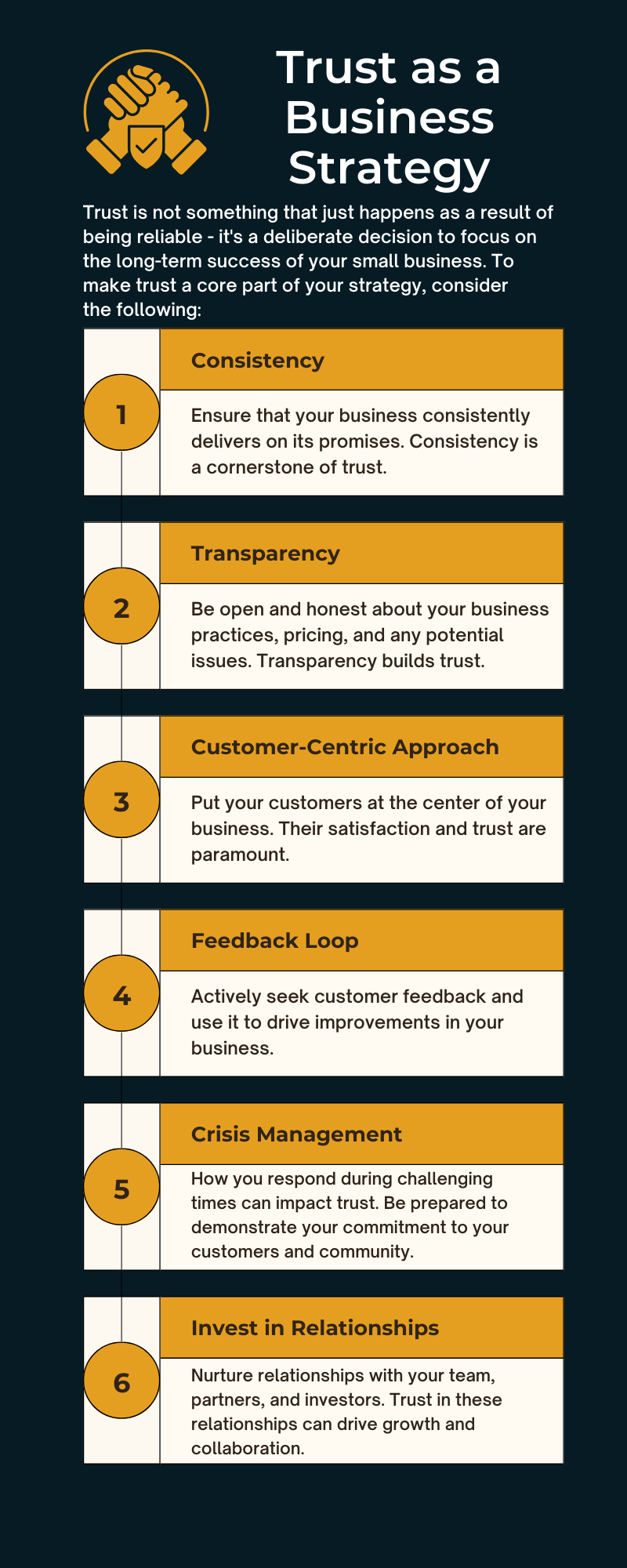
Subscribe to our newsletter!
We don't spam. You will only receive relevant and important tips for you and your business.
Unsubscribe anytime.
By Jacquie
Did you know that 81% of customers say they’re more likely to return to a company they trust? For small businesses, growth isn’t just about getting more clients, it’s about earning their confidence and keeping them. That’s where trust and reliability in business come in. When customers know they can count on you, they don’t just stick around, they spread the word and help your company grow.

What does business reliability really mean? It’s more than showing up on time or delivering as promised. It’s about setting clear expectations, communicating openly, and proving — time and again — that customers can depend on you. When you create this sense of dependability, you’re not just completing transactions; you’re building relationships that last. And those relationships? They’re the fuel for referrals, loyalty, and steady growth.
It’s the small actions — answering calls, being on time, sending reminders, fixing what you promised to fix — that tells customers, “I can count on this company.” That’s the foundation of trust. And in a world full of overpromises and no-shows, that consistency is a real differentiator.
Each act of reliability reinforces your customers' confidence in your business.
Trust without reliability is hollow — and reliability without trust doesn’t inspire loyalty. They work together. Every on-time delivery, every kept promise, and every quick resolution to a concern tells your customers: you can count on us. Over time, that’s what transforms a simple transaction into a lasting partnership.
This doesn’t mean being perfect. It means being honest, communicative, and quick to fix mistakes.
Reliability means showing your customers that even when things don’t go as planned, you’re still the one they can trust to make it right.

When a customer recommends your business to a friend or family member, they are essentially vouching for your reliability. This endorsement is based on their own positive experiences, making it a powerful tool for attracting new clientele.
In any service-based business, especially trades like home services or repairs, customers often don’t know how to compare quotes beyond price. That’s why business reliability becomes your competitive edge.
When customers are deciding between two businesses, they’ll choose the one they believe will follow through. Reliability becomes your reputation — and your reputation becomes your biggest selling point.
Transparency here matters too. When people see you own your mistakes, respond to feedback, and communicate clearly, it shows you're not just reliable — you're real.
Transparency is a fundamental element of trust. Being open and honest about your business practices, pricing, and any potential issues can create a strong sense of trust with your customers.
Transparency goes hand-in-hand with reliability. When customers know what to expect, and there are no hidden surprises, it fosters a sense of security and reliability. Transparency in pricing, for instance, allows customers to make informed decisions and eliminates the fear of hidden costs.
Also, being upfront about any issues or challenges your business faces can further build trust. Customers appreciate honesty and are more likely to trust a business that openly addresses and resolves problems rather than one that hides or denies issues.

And when people feel heard, they stick around. They stay loyal. They leave glowing reviews, and they keep you top of mind the next time — or the next time someone asks them for a recommendation.
When customers see that their feedback leads to improvements or changes within your business, it reinforces their trust in your commitment to their satisfaction. This trust can translate into increased loyalty and positive word-of-mouth.
When things get tough — whether it's a slow season, supply issue, or economic downturn — the trust you’ve built becomes your safety net. Customers who trust you will keep calling. They’ll give you the benefit of the doubt. And they’ll continue to support your business, even when others are cutting corners.
Trust can be a beacon of hope for customers during difficult periods. When they trust a business, they have confidence that the business will do its best to weather the storm and continue providing quality products or services. This trust can lead to ongoing support, even when circumstances are challenging.
Trust and reliability aren’t just for customers. They’re for your employees, your partners, and even your vendors. When your team trusts your leadership and feels supported, they deliver better service. When partners know you’ll hold up your end, they send opportunities your way.
Trust within your team is essential for a harmonious and productive work environment. If your employees don’t trust you, why should your customers? Building reliability starts behind the scenes. When your team feels respected, supported, and empowered, they naturally extend that same reliability to your customers. A trustworthy culture inside your business creates a ripple effect your clients can feel.
Partnerships and collaborations are also built on trust. When other businesses or organizations trust in your reliability and integrity, it opens doors to mutually beneficial relationships. These partnerships can provide opportunities for growth, increased exposure, and expanded resources that can benefit your small business.
Investors, whether they are individuals or venture capitalists, are more likely to invest in businesses they trust. A strong track record of reliability and a transparent, trustworthy approach to business can make your business an attractive investment opportunity.
Trust turns your business into more than a service provider, it turns it into a respected part of the community.
At the end of the day, trust isn’t a buzzword. It’s a strategy. Make reliability in business a core part of your operations. Bake it into how you schedule jobs, talk to customers, follow up, and handle mistakes. That reliability will turn into trust, and that trust will turn into loyalty, growth, and long-term success.
It’s not the fastest path, but it’s the one that lasts.

Trust leads the way at Hoist